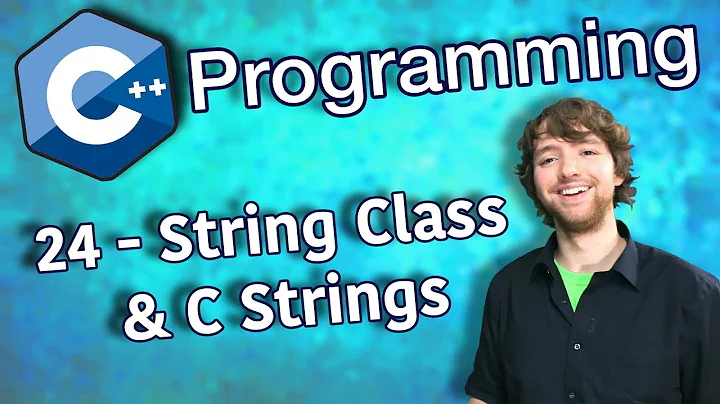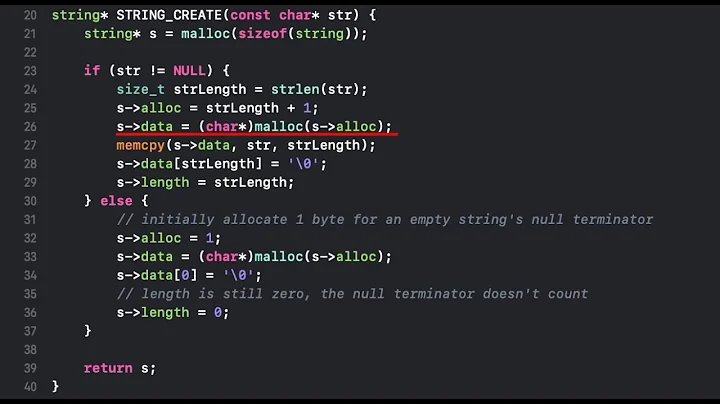Custom string class (C++)
Solution 1
Don't use strlen, store your own string length. The string should not be depended on to have a null terminator. It's ok to use such if you're passed in a random const char*, but for internal operations, you should use the size.
Also, you forgot to make your operator const char* a const overload.
Solution 2
Here's what's going on:
- The constructor is indeed called twice. Once for "hello" and once for " world". The order is undefined.
- The CString::operator + is called on the 1st CString ("hello"), passing the second CString (" world") as it's argument. The return value of CString::operator + is a new CString
- Since you're assigning in initialization, i.e:
CString a = [CString result of operator +], c++ will just call you're copy constructor. Hence the call toCString(CString& )that you're seeing in the debugger.
Now, that's 4 total objects just created, one for each string literal ("hello", and " world"), one for the concatenation of those (the result of the CString::operator + call, and one to hold the result (CString a = ...). Each one of those temporary objects will have it's destructor called.
As for why you're not getting the printf, I have no idea. I just copy pasted your code in this file:
#include <cstdio>
#include <cstring>
[your code]
int main(int argc,char* argv[]) {
CString a = CString("hello") + CString(" world");
printf(a);
}
And when I ran the resulting executable, I got hello world as the output. This is on Ubuntu with g++ 4.4. Not exactly sure why under the VS debugger it's not printing anything.
Related videos on Youtube
Sanctus2099
I love programming, I love OpenGL and GLSL. I'm currently working on my own game engine and it's turning out nicer than most available products.
Updated on April 21, 2022Comments
-
Sanctus2099 about 2 years
I'm trying to write my own C++ String class for educational and need purposes.
The first thing is that I don't know that much about operators and that's why I want to learn them. I started writing my class but when I run it it blocks the program but does not do any crash.
Take a look at the following code please before reading further:class CString { private: char* cstr; public: CString(); CString(char* str); CString(CString& str); ~CString(); operator char*(); operator const char*(); CString operator+(const CString& q)const; CString operator=(const CString& q); };First of all I'm not so sure I declared everything right. I tried googleing about it but all the tutorials about overloading explain the basic ideea which is very simple but lack to explain how and when each thing is called. For instance in my = operator the program calls CString(CString& str); but I have no ideea why.
I have also attached the cpp file below:CString::CString() { cstr=0; } CString::CString(char *str) { cstr=new char[strlen(str)]; strcpy(cstr,str); } CString::CString(CString& q) { if(this==&q) return; cstr = new char[strlen(q.cstr)+1]; strcpy(cstr,q.cstr); } CString::~CString() { if(cstr) delete[] cstr; } CString::operator char*() { return cstr; } CString::operator const char* () { return cstr; } CString CString::operator +(const CString &q) const { CString s; s.cstr = new char[strlen(cstr)+strlen(q.cstr)+1]; strcpy(s.cstr,cstr); strcat(s.cstr,q.cstr); return s; } CString CString::operator =(const CString &q) { if(this!=&q) { if(cstr) delete[] cstr; cstr = new char[strlen(q.cstr)+1]; strcpy(cstr,q.cstr); } return *this; }For testing I used a code just as simple as this
CString a = CString("Hello") + CString(" World");
printf(a);
I tried debugging it but at a point I get lost. First it calls the constructor 2 times for "hello" and for " world". Then it get's in the + operator which is fine. Then it calls the constructor for the empty string. After that it get's into "CString(CString& str)" and now I'm lost. Why is this happening? After this I noticed my string containing "Hello World" is in the destructor (a few times in a row). Again I'm very puzzeled. After converting again from char* to Cstring and back and forth it stops. It never get's into the = operator but neither does it go further. printf(a) is never reached.
I use VisualStudio 2010 for this but it's basically just standard c++ code and thus I don't think it should make that much of a difference -
Sanctus2099 almost 14 yearsI tought of the same thing but apparently I had to make operator const char* a const overload
-
Sanctus2099 almost 14 yearsThank you for your advice. I changed the signatures. The thing is that in different places I see different sigantures so that's why I'm not sure which one is the good or "standard" one. And I see the point in making the default constructor as null only terminated string.




![#12 [C++]. Xâu Ký Tự Trong C++ | Cách Sử Dụng String Trong C++](https://i.ytimg.com/vi/AwBY3AkQO3M/hq720.jpg?sqp=-oaymwEcCNAFEJQDSFXyq4qpAw4IARUAAIhCGAFwAcABBg==&rs=AOn4CLDvh2y2QyJDRta5EjRfTwNCDvDTkg)
![[C++] - Bài 32: Strings trong C++.](https://i.ytimg.com/vi/0C-EP4k7JcQ/hq720.jpg?sqp=-oaymwEcCNAFEJQDSFXyq4qpAw4IARUAAIhCGAFwAcABBg==&rs=AOn4CLDg1D3Ulrloy6QbqAzKRK4HWbPqqw)


